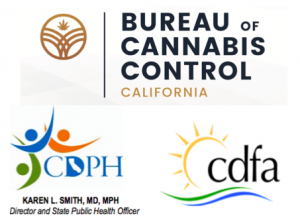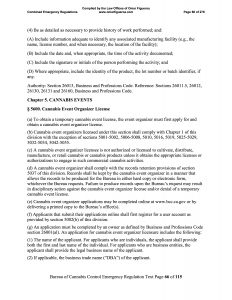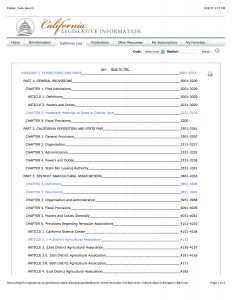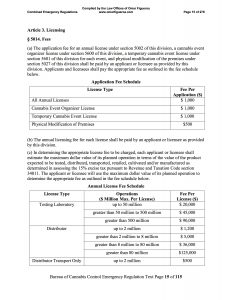Overview of the New Cannabis Event Organizer License in California
by Omar Figueroa
December 8, 2017
California’s Bureau of Cannabis Control (hereafter the “Bureau”) has proposed two new non-statutory licenses: the Cannabis Event Organizer License, as well as the Temporary Cannabis Event License. As 2018 rapidly approaches, the announcement of a new type of state license specific to cannabis events has aroused intense interest in the California cannabis community, particularly with the resounding success of cannabis events such as The Emerald Cup, which is expected to attract tens of thousands of cannabis enthusiasts from all over the world to the Sonoma County Fairgrounds in Santa Rosa.
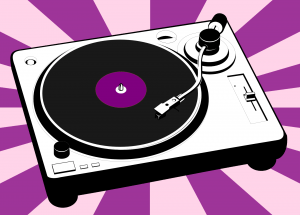
EXECUTIVE SUMMARY
In a nutshell, only cannabis event organizers licensed by the Bureau are allowed to obtain temporary cannabis event licenses, which are also issued by the Bureau. The first step is to apply for and obtain a cannabis event organizer license. The next step is to secure “written approval from the local jurisdiction authorizing the applicant to engage in onsite cannabis sales to, and onsite consumption by, persons 21 years of age or older at the event.” The final step is to obtain a temporary cannabis event permit from the Bureau. Temporary cannabis events can last up to a maximum of four days, which makes them perfect for three-day weekends, but at this time they can only take place at county fairs and district agricultural associations.
Notably, sales to adults 21 and older are authorized at cannabis events; however, only licensed retailers and micro businesses may sell cannabis goods (defined as “cannabis, including dried flower, and products containing cannabis.”) This means that state-licensed cultivators, manufacturers, and distributors who do not also have a state license authorizing the retail sale of cannabis goods will not be allowed to conduct sales at cannabis events. Additionally, all cannabis goods at a cannabis event are required to comply with applicable laboratory testing, labeling, and track and trace requirements.
The consumption of cannabis goods is also allowed at cannabis events provided “the consumption of alcohol or tobacco shall not be allowed on the cannabis event premises.” As expected, access to the area where cannabis consumption is allowed must be restricted to adults age 21 and older, and the event organizer is required to “ensure that cannabis consumption is not visible from any public place or non-age-restricted area.”
LEGAL BACKGROUND & REGULATORY OVERVIEW
California’s three main cannabis regulatory agencies (the Bureau of Cannabis Control within the Department of Consumer Affairs, CalCannabis Cultivation Licensing within the California Department of Food and Agriculture, and the Manufactured Cannabis Safety Branch within the California Department of Public Health) released released proposed emergency regulations in November of 2017.
A handy PDF containing all three sets of proposed emergency regulations combined into one document can be downloaded by clicking here or the image to the right.
The Bureau of Cannabis Control proposed two new non-statutory licenses which are not enumerated in the Medicinal and Adult-Use Cannabis Regulation and Safety Act (MAUCRSA): the cannabis event promoter license, as well as the temporary cannabis event license. The Bureau’s regulations pertaining to cannabis events are set forth in Chapter 5 (pertaining to “Cannabis Events”) of its proposed emergency regulations.
A helpful PDF containing the portion of the proposed emergency regulations specifically pertaining to cannabis events can be downloaded here or by clicking the image below.
As noted in the Executive Summary above, sales to adults 21 and older are authorized at cannabis events, which makes such events radically different than previous cannabis events in California, where historically only medical cannabis patients were allowed in the “215 area.” Another change will be that only licensed retailers and micro businesses may sell cannabis goods (defined as “cannabis, including dried flower, and products containing cannabis.”) This means that state-licensed cultivators, manufacturers, and distributors will not be allowed to conduct sales at cannabis events, and neither will medical cannabis collectives and cooperatives, unless they also have a state license authorizing the retail sale of cannabis goods. In contrast to the laissez faire cannabis bazaar of past unregulated events, all cannabis goods at state-licensed cannabis event are required to comply with existing laboratory testing, labeling, and track and trace requirements. On that note, all “cannabis goods sold onsite at a cannabis event shall be transported to the site by a distributor.” § 5602(e).
There are no limits on the minimum or maximum number of attendees for a state-licensed cannabis event, although the fees are prohibitive for small-scale events given that the fee schedule is not tiered based on the number of attendees, which means that the fees would be the same for an intimate event of a few dozen attendees as they would be for a massive festival attracting tens of thousands of attendees.
The consumption of cannabis goods is also allowed at cannabis events provided “the consumption of alcohol or tobacco shall not be allowed on the cannabis event premises.” Not surprisingly, access to the area where cannabis consumption is allowed must be restricted to adults age 21 and older, and the event organizer is required to “ensure that cannabis consumption is not visible from any public place or non-age-restricted area.”
This separate age-restricted cannabis consumption area (analogous to the “215 area” of past events) implies that persons under the age of 21 and minors are not excluded from cannabis events entirely, but cannot venture outside the boundaries of the non-age-restricted area. This is a welcome relief for parents with children and babes-in-arms, and opens up the possibility of family friendly cannabis events with separate age-restricted areas where adults can consume cannabis, akin to beer gardens at county fairs in California.
LOCATION OF CANNABIS EVENTS
For the time being, cannabis events can only take place at county fairs and district agricultural associations. Business and Professions Code § 26200, subdivision (e), provides:
“This division does not prohibit the issuance of a state temporary event license to a licensee authorizing onsite cannabis sales to, and consumption by, persons 21 years of age or older at a county fair or district agricultural association event, provided that the activities, at a minimum, comply with the requirements of paragraphs (1) to (3), inclusive, of subdivision (g), that all participants are licensed under this division, and that the activities are otherwise consistent with regulations promulgated and adopted by the bureau governing state temporary event licenses. These temporary event licenses shall only be issued in local jurisdictions that authorize such events.”
It is important to note that Business and Professions Code § 26200(e) does not expressly prohibit the issuance of a state temporary event license at locations other than “a county fair or district agricultural association” and it could be argued that events at other locations, such as stadiums, concert halls, and convention centers, are not prohibited under California law.
Nevertheless, the Temporary Cannabis Event License Application requests the “Address of the County Fair or District Agricultural Association of the Event” at Section C, question 3. Until California law and/or the regulations are amended, event licenses will not be issued for locations such as stadiums, concert halls, and convention centers.
A map showing the county fairs and district agricultural associations across California is below.
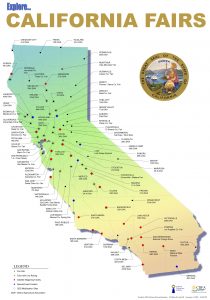
A chart showing Property Ownership Among California Fairs is included below for your convenience; please let us know if you run across a more updated version.
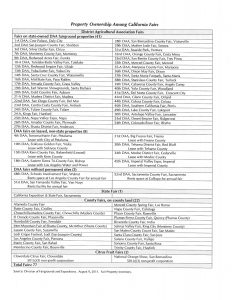
The Food & Agricultural Code sets forth the provisions that apply to the administration of county fairs and district agricultural associations; you can access the relevant California Codes by clicking the image below.
Critically, the regulations require that an application for a Temporary Cannabis Event License include “written approval from the local jurisdiction authorizing the applicant to engage in onsite cannabis sales to, and onsite consumption by, persons 21 years of age or older at the event.” § 5601(d)(8). Since local jurisdictions in effect have “veto power” over cannabis events, a prudent cannabis event organizer would be wise to establish good working relationships with local officials in order to secure the requisite written approval from the local jurisdiction.
The California Department of Food and Agriculture has published these Cannabis Event Guidelines for District Agricultural Associations.
CANNABIS EVENT APPLICATION MATERIALS
On December 7, 2018, the Bureau made available the initial set of cannabis event applications. For your convenience, they can be downloaded below. Please keep in mind that in order to obtain a Temporary Cannabis Event License, the event organizer must first apply for and obtain a Cannabis Event Organizer License
Cannabis Event Organizer License Application
Instructions for the Cannabis Event Organizer License Application
Temporary Cannabis Event License Application
Instructions for the Temporary Cannabis Event License Application
Attachment: List of Licensees That Will Provide Onsite Sales of Cannabis Goods
APPLICATION AND LICENSE FEES FOR CANNABIS EVENTS
There are two types of fees that event organizers need to consider: application fees and license fees. They are set forth at § 5014 of the regulations, which can be can be downloaded here or by clicking the image below.
The application fees for both the Cannabis Event Organizer License and the Temporary Cannabis Event License are the same: $1,000.
Additionally, there is a separate annual license fee for the Cannabis Event Organizer License, which depends on planned number of events per year. (There is no separate license fee for a Temporary Cannabis Event License.) The annual license fee for the Cannabis Event Organizer License is $5,000 per license if the event organizer plans “1-10 events annually”, and twice as much, $10,000 per license, if the number of planned events is “greater than 10 events annually.”
Assuming an organizer wants to plan a single annual event, the total fees payable to the Bureau would be computed as follows: $1,000 application fee for the Cannabis Event Organizer License, plus a $5,000 annual license fee, plus a $1,000 application fee for the Temporary Cannabis Event License, for a total of $7,000.
If the organizer plans ten annual events, the total fees payable to the Bureau would be computed as follows: $1,000 application fee for the Cannabis Event Organizer License, plus a $5,000 annual license fee, plus a $1,000 application fee for each Temporary Cannabis Event License ($10,000 for ten events) for a grand total of $16,000.
If the organizer plans eleven annual events, the total fees payable to the Bureau would be computed as follows: $1,000 application fee for the Cannabis Event Organizer License, plus a $10,000 annual license fee, plus a $1,000 application fee for each Temporary Cannabis Event License ($11,000 for ten events) for a grand total of $22,000.
If the organizer plans twenty annual events, the total fees payable to the Bureau would be computed as follows: $1,000 application fee for the Cannabis Event Organizer License, plus a $10,000 annual license fee, plus a $1,000 application fee for each Temporary Cannabis Event License ($20,000 for twenty events) for a grand total of $31,000.
CONCLUSION
The issuance of two new license types by the Bureau of Cannabis Control presents an unprecedented opportunity for event organizers: adult-use cannabis events where sales and social consumption are specifically licensed by the State of California.
Please contact the Law Offices of Omar Figueroa at (415) 489-0420 or at (707) 829-0215 if you would like legal advice and legal representation in securing a Cannabis Event Organizer License as well as Temporary Cannabis Event Licenses.

